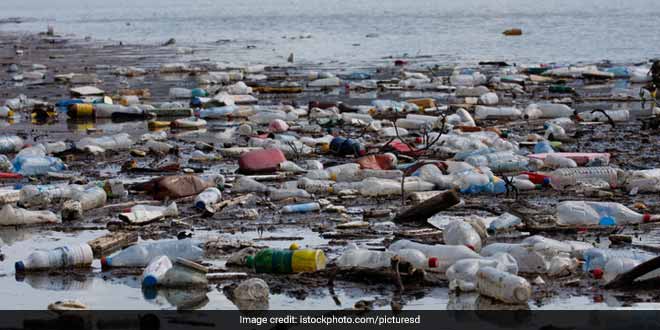Highlights
- Every year the world uses 500 billion plastic bags
- Eight million tonnes of plastic end up in the oceans every year
- Consumers must examine their relationship with plastic: UN Envt Head
New Delhi: Plastic pollution is one of the biggest environmental threats and countries need better waste management to cope with the sheer quantity of plastic rubbish that is fouling the waters and environment, says United Nations Environment head Erik Solheim.
“Plastic pollution is one of the biggest environmental threats the planet is facing right now,” Mr Solheim emphasised.
Sample these startling facts about plastic pollution: Every year the world uses 500 billion plastic bags. Fifty per cent of the plastic we use is single-use or disposable. Each year, at least eight million tonnes of plastic end up in the oceans, the equivalent of a full garbage truck every minute.
In the last decade, the world produced more plastic than in the whole of last century.
We’re throwing up to 13 million tonnes of plastic waste into the oceans each year, and in the next decade that could double. We’re turning the oceans into a plastic soup, the UN Under-Secretary-General told IANS in an exclusive online interview.
“This has to stop, and right now, because it’s harming marine life and ending up in our own food and water supplies. If it’s not resolved, this is a problem that will come back to bite us. It’s also a problem that’s difficult to clean up.
We’d like to see a mass mobilisation of people around the world and big clean-ups. These are important because no amount of clean-ups can solve this issue. We need upstream change, that means a change in the way we use plastic, Mr Solheim, who is coming to India, a host to UN Environment-led global event World Environment Day on June 5.
Also Read: World Environment Day 2018: What Does It Take To #BeatPlasticPollution? Actor Dia Mirza Explains
“Beat Plastic Pollution”, the theme for World Environment 2018, urges governments, industry and individuals to explore sustainable alternatives and reduce the production and excessive use of single-use plastic polluting oceans, damaging marine life and threatening human health.
We need consumers to pause and examine their relationship with plastic. If we look at our daily lives, there is so much single-use and throwaway plastic that can easily be eliminated and replaced with sustainable alternatives. If enough people do this, it translates into colossal consumer power! Mr Solheim said.
For companies, he says: “Then we want industry to innovate, to find sustainable alternatives and embrace the idea of extended producer responsibility — by which a manufacturer takes responsibility for the entire lifecycle of their product.”
I strongly believe that the companies that innovate now will be the winners of the future.
“We also want governments to drive this change through legislation, and ensure we have strong enforcement. It’s about ensuring manufacturers have the necessary incentives in place to do the right thing.”
There’s no single, magic solution to enforce a ban on single-use pet bottles or straws. Every minute we buy one million plastic bottles globally, according to the UN Environment.
It’s clear that we need better waste management to cope with the sheer quantity of plastic rubbish. But let’s not see this as just a litter problem. We need to stop wasteful practice and to do that bans on certain single-use plastic items are helpful, he said.
Ultimately, though, we need changes in design. We need to see sustainable alternatives emerge on the market to replace so much of the wasteful plastic products that we use.
Yes, India needs more Afroz Shah, not only for clean-up oceans but also for rivers and mountains.
Afroz Shah is a great inspiration, not only for India but for the entire world. So yes, we do need more people like him! What is important is not just the quantity of litter that has been collected, but that a powerful message has been sent around the world and that this message has been heard!
Afroz Shah, a young lawyer from Mumbai, and his volunteers have removed around 13 million kilos of waste since 2015 in what the UN has called “the world’s largest beach cleanup project“.
Mr Solheim is optimistic that India can act as a catalyst for curbing pollution.
Prime Minister (Narendra) Modi recently said it would be a crime against future generations not to take action on climate change.
India, therefore, carries a strong moral argument. In addition, India is among the nations that stand to suffer the biggest impact from climate change; so it’s important that it acts as a powerful voice for action on the global stage, he said.
“India is also innovating, and that’s what I think will be its biggest act of leadership: showing climate action can also unlock incredible economic gains,” he added.
Also Read: World Environment Day 2018: 5 Things To Know About This Year’s Celebrations On June 5




























